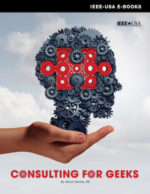A Success Story – Bill Schweber (PE) – Engineer/Author/Editor
Bill Schweber is a fellow member of the Laid-Off-Twice club. When it happened the second time two years ago, he decided to hang out his shingle and has been having a ball ever since.
Bill is an Electrical Engineer who specializes in technical communications. His quick success is no surprise. Engineers who can communicate effectively are special and in high demand. Consultants often thrive at the intersection of diverse skill sets.
Bill has written three text books, hundreds of technical articles, opinion columns, and product features. He was an editor for EDN (a leading trade magazine for EEs) and in marketing communications for Analog Devices (a leading vendor of analog and mixed signal ICs.) And much more, including analog and power electronics design.
As such, he had immediate visibility and credibility in the technical community.
I’ve know Bill for many years–it gives me great pleasure to share his success story here!
(1) What prompted you to consider consulting (running your own business?) Was there an event, like a layoff, or was it just the itch to be on your own?
It was a combination of things: a layoff was the trigger, but I had become increasingly disillusioned and even cynical with all the corporate craziness, politics, constant changes in strategies and inexplicable rationales for each, and had a real desire to have more control–for better and worse–of my time and energy.
(2) How has it been going? Looks like you’ve been at it a while, so obviously you are established in your business.
Full-time writer about engineering advances, trends, products, and technical engineering topics since June 2012, and it’s been going well, I’m keeping busy full-time and with a solid queue of both first-time and follow-on projects.
(3) What do you like MOST about consulting (your own business?)
Ability to set my own priorities, with flexibility that suits my needs.
(4) What do you like LEAST about consulting (your own business?)
The usual complaint: the lag between starting a project, completing it, and getting paid!
(5) How do you get your clients? (BTW, the number one question I get asked when someone finds out I’m a consultant.)
I was a visible and reasonably well-known editor for many years at major trade publications, and had met many key players in person, so I was known by, or known to, many in the industry.
So I contacted many of them and said I was available, and that started things rolling. I also get a lot of referrals from clients to people they know and need help, as well as sales/marketing people who have customers who need help.
(6) How do you set your fees? (Second question I get asked.)
Usually I estimate using a fixed rate per word, but charging less if it is a re-write or there is a lot of good collateral available, and more if there is a lot of research needed. Or, I establish a fee for the project, based on how long I think it will take.
I rarely charge by the hour, it’s too awkward and leads to bad feelings (they think you are acting like a lawyer, stretching things out). But I have an internal per-hour rate I like each project to bring in, to justify if it is worth my time.
(7) How did you decide what to consult about (or focus on?) And why? (Third question I get asked.)
I focus on the fact that I am an engineer who really understands what the client is talking about; I am not just repeating the words to them. When they talk technical, I understand and can ask solid questions.
When I interview technical people at the client to get the information I need, I emphasize two things:
(a) this is not a “60 Minutes” ambush interview or hatchet job, and
(b) I am a real engineer with solid hands-on experience and broad expertise, not just a “science writer” or, worse yet, a journalist who talks smoothly and spells the words right, but doesn’t really understand the subject, the technical terms, the underlying issues.
This usually brings a major sigh of relief and minimizes the fear factor as well as their concern that I will not grasp the key points or get them wrong.
I also tell people that I spent 8 years in high-tech marketing, so I understand how to frame the result but also to ask the tough key questions up front:
-What is the story or product here?
-Who is the target for the resulting story (such as editors, end users, trade show audience, investors, co-workers)?
-Why would they be interested in reading it?
-What’s the audience’s background on this?
-And finally, the key questions: what’s significant about what you have, anyway? What do you bring to the party that’s new, noteworthy, or different?
(8) Lessons learned since you started consulting?
Most projects are hurry-up-and wait, then they move to crisis “we need it now” mode.
(9) What next? Do you plan to do this the rest of your career (like I did?) Or is this a stepping stone to other things?
I plan to do this until I no longer can. I’d be a fool not to!
(10) Finally, what one piece of advice would you give to our fellow engineers who might be thinking about consulting (or going out on their own?)
Contact people who know and respect what you’ve done, tell them you are available if they need help, and ask them to let others know, as well.
Then deliver a quality, thorough, wrapped-up project with no loose strings, and do it on time or even ahead of deadline.
Bill Schweber, PE — Jaffa Engineering — schweber (at) att (dot) net
P.S. Been a bit sparse on posting of late. Took some vacation time, but now getting back into the groove. Thanks for riding along!
© 2014, https:. All rights reserved.





